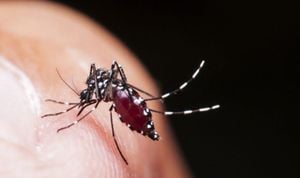Lee Ji-ah, the South Korean actress known for her roles and renowned family background, has publicly addressed the intense scrutiny surrounding her grandfather, Kim Soon-hung, whose pro-Japanese actions during Korea's turbulent history have sparked considerable controversy.
On February 21, 2025, through a statement released by her agency, BH Entertainment, Lee Ji-ah expressed deep remorse for the historical wrongdoings attributed to her grandfather. "I recognize the historical wrongdoing of my grandfather and sincerely apologize as his descendant," she stated, echoing sentiments aimed at clarifying her position amid rising tensions about the family's legacy.
The controversy gained prominence when reports emerged of legal battles within her family concerning land valued at approximately 35 billion won, inherited from Kim Soon-hung. Lee Ji-ah emphasized her detachment from these disputes, claiming ignorance of the situation: "I have not made any statements expressing respect for my grandfather; this is incorrect and needs rectification."
Lee Ji-ah detailed her personal history, highlighting her independence since the age of 18. "I have not received any financial support from my parents, and I have been estranged from them for more than 10 years due to complex family dynamics," she said. Her statements reflect the strain within her family, particularly surrounding the recent inheritance conflicts involving property previously held for military use—a situation complicated by the legacy of her grandfather's actions.
Addressing the sensitive topic of her grandfather's actions, Lee Ji-ah stated, "I found out about my grandfather’s pro-Japanese actions through articles, and it is unacceptable to justify his actions under any circumstances." Her commitment to confronting the historical narrative surrounding her family has been underlined by her visits to the National Institute for Korean History, where she sought to educate herself about her grandfather's past.
According to Lee Ji-ah, any land acquired during the Japanese occupation must be recovered by the state. "If the disputed land was acquired during the Japanese occupation, it should be recovered by the state," her firm stance shows her willingness to recognize historical injustices. This acknowledgment adds depth to her apologies and her obligations as someone who inherited the legacy of her family's choices.
Closing her statement, Lee Ji-ah alluded to her desire to not only rectify her family's narrative but also to engage with history responsibly. "I deeply recognize the historical wrongs and, as his descendant, I sincerely apologize. Moving forward, I will face the truth of history with humility and responsibility," she commented, indicating her intentions to navigate the complex legacy left by her grandfather and the public perceptions formed around it.
This controversy raises broader discussions about the responsibilities of descendants of historical figures and how familial histories influence personal identity and public perception. Lee Ji-ah's confrontation with her family's past highlights the struggle faced by many who grapple with legacies of shame and the expectations imposed upon them by society.



